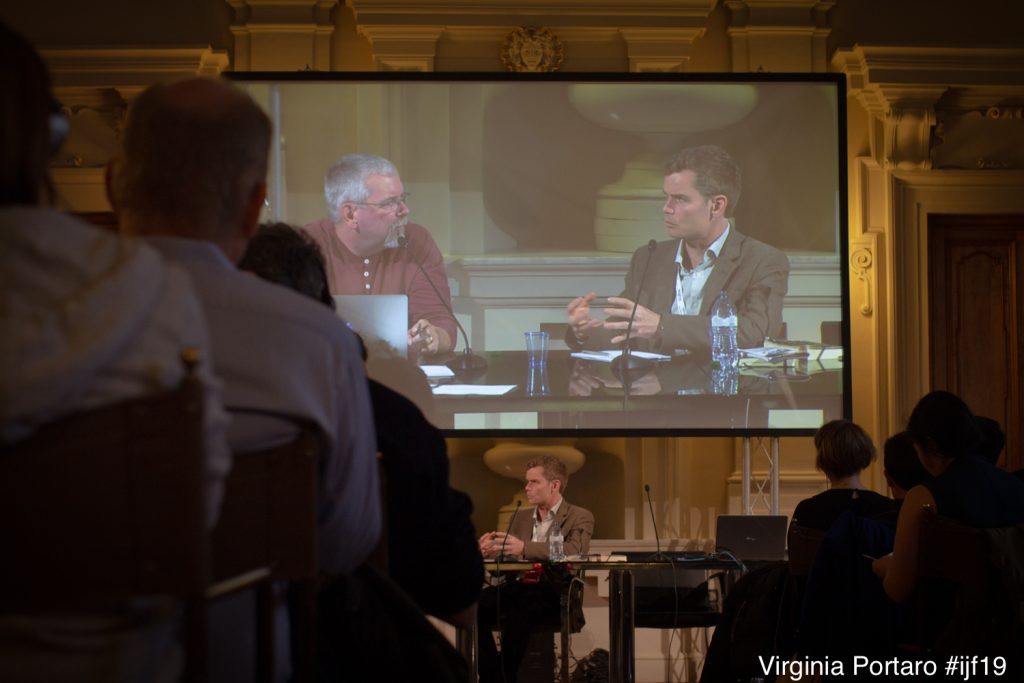Stay up to date by subscribing to our Newsletter or by following our Telegram channel, and join the conversation on Facebook, Twitter, and Instagram.
Edited by Marco Nurra
Watch all #ijf19 sessions on-demand: media.journalismfestival.com
Disinformation is polluting our media environment. Facts won’t save us. “My proposal is that we begin thinking ecologically, an approach I explore with Ryan Milner, a communication scholar, in our forthcoming book You Are Here: A Field Guide for Navigating Polluted Information. From an ecological perspective, Wardle’s term “information pollution” makes perfect sense. Building on Wardle’s definition, we use the inverted form “polluted information” to emphasize the state of being polluted and to underscore connections between online and offline toxicity,” writes Whitney Phillips.
Guardian investigation reveals a covert plot to control some of Facebook’s largest far-right pages and harvest Islamophobic hate for profit. This group is now using its 21-page network to churn out more than 1,000 coordinated faked news posts per week to more than 1 million followers, funnelling audiences to a cluster of 10 ad-heavy websites and milking the traffic for profit.
Be aware! Politicians are now trying to fool voters by behaving like ‘fact-checkers’. The fight against misinformation has reached a new level of absurdity during the British general election campaign. Besides checking dozens of claims made by politicians on television debates, fact-checkers now have to be alert and report on it when a political party starts impersonating “a new and reliable verification platform” on its social media channels.
The junk cycle. The Columbia Journalism Review uses the fake “drunk Pelosi” video to discuss how reporters rushing to stories fail to verify information. “Success means that more people click. It is, roughly, the business model of pornography. Every day, hundreds, if not thousands, of digital journalists seek the high that comes from posting first,” writes Ravi Somaiya in the article.
Donald Trump’s embracing of the term ‘fake news’ has legitimised the tactic for other world leaders and despots. As president, Donald Trump first tweeted about “fake news” a few weeks after he was elected.
Freedom of expression is at a ten-year low, study says. According to a new report from the UK-based charity Article 19 (named for one of the clauses in the Universal Declaration of Human Rights) freedom of expression has reached a ten-year low globally, as a result of what the report calls “digital authoritarianism” and threats against journalists.
How governments use the internet to crush online dissent. From Egypt to Vietnam, what was once a tool for revolution is now putting revolutionaries’ lives in danger. How governments use the internet to crush online dissent.
After more than two years, the Daphne Caruana Galizia murder case leaps forward. These developments have proved a death knell for Muscat, who has faced longstanding criticism for his handling of Caruana Galizia’s case. Some observers—including Caruana Galizia’s family and the Times of Malta’s editorial board—want him gone sooner. “Muscat has delayed his resignation in an attempt to continue protecting himself and Schembri,” the family wrote. “There is no alternative explanation.”
Blood and Soil in Narendra Modi’s India. The Prime Minister’s Hindu-nationalist government has cast two hundred million Muslims as internal enemies. Rana Ayyub was a #ijf19 speaker:
🎥 #metoo in India: a cultural revolution – #ijf19 on-demand https://t.co/vL6peyoaTi
— journalism festival (@journalismfest) December 2, 2019
with @RanaAyyub and Priya Ramani
(Moderated by @BarbaraGSerra) pic.twitter.com/AVtAtUxmJl
Vladimir Putin’s law to stifle Russian journalists. A new law in Russia could shut down critical speech by reclassifying some journalists as “foreign agents.” By creating a climate of fear, the government is forcing reporters to self-censor.
Duterte threatens to shut down Philippine broadcaster ABS-CBN. On December 3, Duterte threatened ABS-CBN, a privately owned news network whose franchise agreement is due to expire on March 30, 2020, saying, “Your franchise will end next year. If you expect it to be renewed, I’m sorry. I will see to it that you’re out,” according to a report by Philippine news website Rappler.
“A civilian camp in Syria was bombed. Here’s how we traced the culprit.” Eyewitness photos and videos, flight logs and cockpit tapes obtained by The New York Times enabled reporters to trace an airstrike on a Syrian camp for displaced families to a Russian pilot.
Google and YouTube reportedly pull hundreds of Trump ads for violating policies. YouTube chief executive officer confirmed in interview there were ‘ads of Trump that were not approved to run on Google or YouTube’.
The most important traffic driver for news publishers worldwide? Still Google. Google remains the most important traffic source for news companies globally. It generated two-thirds of outside traffic in 2018, compared to Facebook (30%) and Twitter (3%).
The International Journalism Festival #ijf19 On-Demand
Every week, one recommendation from the extensive programme of the last edition of the International Journalism Festival.

Today we are inviting you to watch “Democracy hacked: how technology is destabilising global politics“. In the space of one election cycle, authoritarian governments, moneyed elites and fringe hackers figured out how to game elections, bypass democratic processes, and turn social networks into battlefields. Facebook, Google and Twitter – where our politics now takes place – have lost control and are struggling to claw it back. Prepare for a new strain of democracy. A world of datafied citizens, real-time surveillance, enforced wellness and pre-crime. Where switching your mobile platform will have more impact on your life than switching your government. Where freedom and privacy are seen as incompatible with social wellbeing and compulsory transparency. As our lives migrate online, we have become increasingly vulnerable to digital platforms founded on selling your attention to the highest bidder. Our laws don’t cover what is happening and our politicians don’t understand it. But if we don’t change the system now, we may not get another chance.

